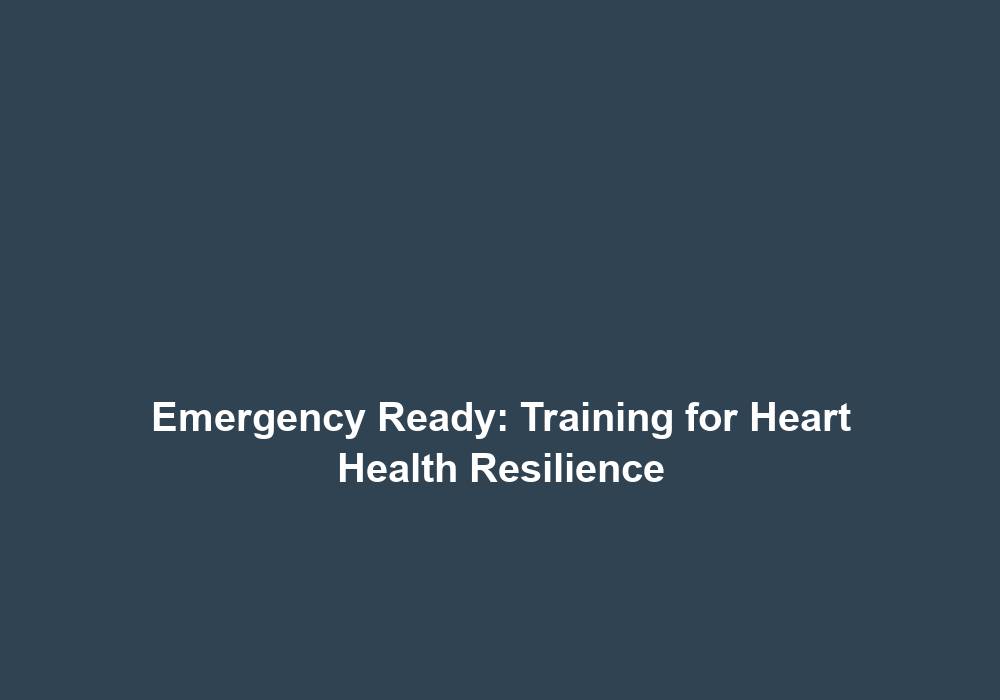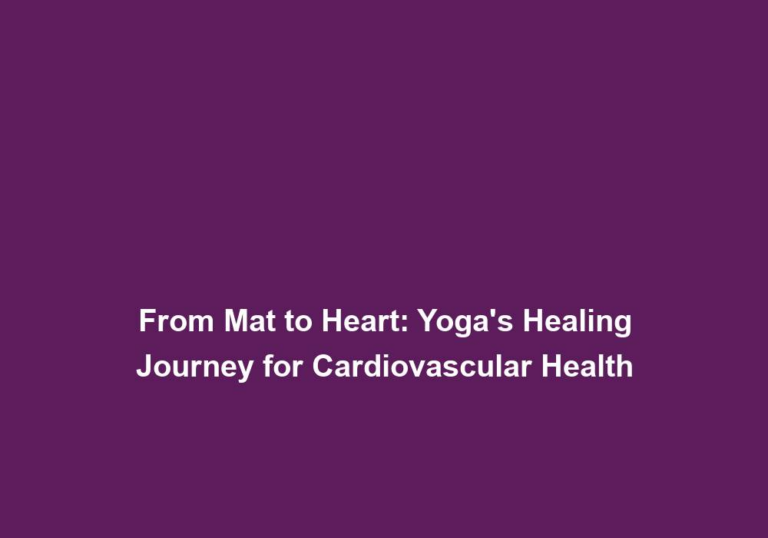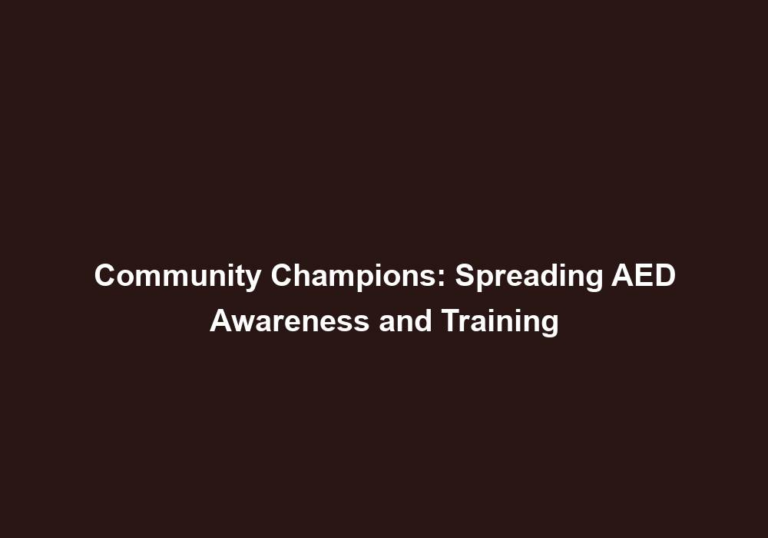Emergency Ready: Training for Heart Health Resilience
The human heart is a vital organ that plays a crucial role in our overall well-being. It is responsible for supplying oxygen and essential nutrients to all parts of our body. However, heart-related illnesses have become increasingly common in today’s fast-paced world. In order to ensure heart health resilience, it is important to be prepared for emergencies and to have the necessary training and knowledge to act swiftly and effectively. This article will provide valuable insights into emergency preparedness and training methods that can help safeguard your heart health.
Understanding the Importance of Emergency Preparedness
Emergency situations can arise unexpectedly, and being prepared can make a significant difference in saving lives, especially when it comes to heart-related emergencies. In a cardiac event, time is of the essence, and immediate intervention can greatly improve the chances of survival. Therefore, it is crucial to have the necessary knowledge and skills to respond appropriately during such critical moments.
Why is emergency preparedness important for heart health resilience?
- Prompt response during a heart-related emergency can potentially save lives.
- Immediate intervention increases the chances of survival.
- Having the necessary knowledge and skills empowers individuals to take swift action.
What are the benefits of being prepared for emergencies?
- Reduced risk of complications and long-term health issues.
- Ability to provide immediate care and support to someone in need.
- Increased confidence and peace of mind knowing you can handle emergencies effectively.
How can emergency preparedness training make a difference?
- Training equips individuals with the necessary skills to recognize symptoms and respond appropriately.
- It ensures a quicker and more efficient response during critical moments.
- Training provides individuals with the confidence to take action and potentially save lives.
Basic Life Support (BLS) Training
One of the fundamental aspects of heart health resilience training is Basic Life Support (BLS). BLS is a set of skills that enables individuals to provide immediate care to a person experiencing cardiac arrest or other heart-related emergencies. BLS techniques include cardiopulmonary resuscitation (CPR), which involves chest compressions and rescue breaths, and the use of automated external defibrillators (AEDs) to restore normal heart rhythms.
What is Basic Life Support (BLS) training?
- BLS training teaches individuals how to respond and provide immediate care during heart-related emergencies.
- It includes learning techniques such as CPR and the use of AEDs.
- BLS training focuses on equipping individuals with the necessary skills to initiate life-saving interventions.
Why is BLS training important for heart health resilience?
- Immediate CPR and AED use can significantly increase the chances of survival during cardiac emergencies.
- BLS training empowers individuals to take action and provide critical care until medical professionals arrive.
- It ensures that individuals have the knowledge to recognize symptoms and respond appropriately.
What are the key components of BLS training?
- Learning how to perform CPR correctly, including chest compressions and rescue breaths.
- Understanding how to use an AED effectively to restore normal heart rhythms.
- Recognizing the signs of a heart emergency and knowing when to initiate BLS techniques.
Advanced Cardiac Life Support (ACLS) Training
For individuals seeking a more comprehensive understanding of heart health resilience, Advanced Cardiac Life Support (ACLS) training is highly recommended. ACLS builds upon the foundation of BLS and provides a deeper level of knowledge and skills necessary to manage cardiac emergencies.
What is Advanced Cardiac Life Support (ACLS) training?
- ACLS training expands on the concepts taught in BLS training and delves deeper into managing cardiac emergencies.
- It covers a wide range of topics, including the recognition and management of cardiac arrest, acute coronary syndromes, stroke, and other life-threatening cardiovascular emergencies.
- ACLS training equips individuals with advanced techniques such as airway management, administering intravenous medications, and interpreting electrocardiograms (ECGs).
Why is ACLS training important for heart health resilience?
- ACLS training provides individuals with a higher level of knowledge and skills necessary to handle complex cardiac emergencies.
- It enhances the ability to make critical decisions in emergency situations.
- ACLS training ensures that individuals have a comprehensive understanding of managing various cardiovascular emergencies.
What are the key components of ACLS training?
- Learning advanced techniques for airway management, including intubation and ventilation.
- Understanding how to administer intravenous medications for cardiovascular emergencies.
- Gaining proficiency in interpreting electrocardiograms (ECGs) to make critical decisions.
Importance of Regular Physical Exercise
While emergency preparedness training is vital for heart health resilience, it is equally important to adopt a proactive approach to prevent cardiac issues. Regular physical exercise plays a pivotal role in maintaining a healthy heart. Engaging in cardiovascular activities such as walking, jogging, swimming, or cycling helps strengthen the heart muscle, improve blood circulation, and reduce the risk of heart diseases.
Why is regular physical exercise important for heart health resilience?
- Regular exercise strengthens the heart muscle, improving its efficiency and ability to pump blood.
- It enhances blood circulation, ensuring a steady supply of oxygen and nutrients to the body.
- Exercise helps control weight, lower blood pressure, and reduce the risk of heart diseases.
What types of physical exercise are beneficial for heart health resilience?
- Cardiovascular exercises such as brisk walking, jogging, swimming, or cycling.
- High-intensity interval training (HIIT) for improved cardiovascular fitness.
- Strength training exercises to build muscle and support overall cardiovascular health.
How much physical exercise should be incorporated for optimal heart health resilience?
- Engaging in at least 150 minutes of moderate-intensity aerobic exercise per week.
- Alternatively, 75 minutes of vigorous-intensity exercise can also be beneficial.
- Incorporating strength training exercises at least twice a week further enhances cardiovascular health.
Eating a Heart-Healthy Diet
In conjunction with regular exercise, maintaining a heart-healthy diet is essential for optimal heart health resilience. A balanced diet rich in fruits, vegetables, whole grains, lean proteins, and healthy fats can significantly reduce the risk of heart diseases. It is important to limit the consumption of processed foods, sugary beverages, and foods high in saturated and trans fats, as these can contribute to the development of heart-related issues.
- A heart-healthy diet emphasizes whole, unprocessed foods that provide essential nutrients and promote heart health.
- It includes a variety of fruits, vegetables, whole grains, lean proteins, and healthy fats.
- Foods to limit include processed foods, sugary beverages, and foods high in saturated and trans fats.
Why is maintaining a heart-healthy diet important for heart health resilience?
- A balanced diet reduces the risk of heart diseases by providing essential nutrients and promoting overall health.
- It helps control blood pressure, cholesterol levels, and weight management.
- A heart-healthy diet supports the proper functioning of the heart and cardiovascular system.
What are some key components of a heart-healthy diet?
- Incorporating a variety of fruits and vegetables for their antioxidants and fiber content.
- Choosing whole grains over refined grains for their higher nutrient content.
- Opting for lean proteins such as fish, poultry, and legumes, while limiting red meat consumption.
- Including healthy fats from sources like olive oil, nuts, and avocados.
Effective Stress Management
Chronic stress can take a toll on the heart and increase the risk of heart diseases. Therefore, it is crucial to incorporate effective stress management techniques into our daily lives. Engaging in activities such as yoga, meditation, deep breathing exercises, or pursuing hobbies can help alleviate stress and promote heart health resilience.
Why is effective stress management important for heart health resilience?
- Chronic stress can contribute to high blood pressure, inflammation, and other factors that increase the risk of heart diseases.
- Managing stress effectively improves overall well-being and reduces the burden on the heart.
- Stress management techniques promote relaxation, lower blood pressure, and support heart health.
What are some effective stress management techniques for heart health resilience?
- Practicing yoga or meditation to promote relaxation and reduce stress levels.
- Engaging in deep breathing exercises to activate the body’s relaxation response.
- Finding and pursuing hobbies or activities that bring joy and help relieve stress.
How can stress management techniques be incorporated into daily life?
- Setting aside dedicated time for relaxation and stress-relieving activities.
- Prioritizing self-care and engaging in activities that promote mental and emotional well-being.
- Learning and implementing stress management techniques as part of a daily routine.
Regular Heart Check-ups
Regular medical check-ups are an integral part of maintaining heart health resilience. It is recommended to schedule routine visits with a healthcare professional to monitor your heart health and identify any potential risks or underlying conditions. These check-ups may include blood pressure measurements, cholesterol screenings, and other diagnostic tests to assess the overall state of your heart.
Why are regular heart check-ups important for heart health resilience?
- Regular check-ups allow for early detection and management of potential heart issues.
- Monitoring blood pressure and cholesterol levels helps identify risk factors for heart diseases.
- Diagnostic tests can provide valuable insights into the overall state of the heart and cardiovascular system.
What are some key tests and measurements during heart check-ups?
- Blood pressure measurements to assess the force exerted on artery walls.
- Cholesterol screenings to evaluate lipid levels and assess cardiovascular risk.
- Electrocardiograms (ECGs) to detect abnormal heart rhythms or other potential issues.
How often should individuals schedule heart check-ups for optimal heart health resilience?
- Frequency may vary depending on individual risk factors and medical history.
- Generally, it is recommended to schedule regular check-ups at least once a year.
- Individuals with pre-existing heart conditions or higher risk factors may require more frequent monitoring.
The Role of Community Support
In times of emergencies, having a supportive community can make a significant difference. Encouraging your community to undergo emergency preparedness training and promoting heart health awareness can help create a resilient environment. Consider organizing workshops, seminars, or community events that focus on CPR and BLS training, healthy lifestyle choices, and stress management techniques. Together, we can build a community that is well-prepared to respond to heart emergencies and promote heart health resilience.
Why is community support important for heart health resilience?
- A supportive community fosters a culture of preparedness and response during heart emergencies.
- Community awareness and training help ensure a quicker and more effective response in critical situations.
- Collective efforts can create a resilient environment that prioritizes heart health and well-being.
How can individuals promote community support for heart health resilience?
- Organizing workshops, seminars, or community events that focus on emergency preparedness training, including CPR and BLS techniques.
- Collaborating with local healthcare professionals, organizations, or community centers to spread awareness about heart health.
- Encouraging community members to adopt healthy lifestyle choices and providing resources for stress management and overall well-being.
What are the potential benefits of community support for heart health resilience?
- Increased awareness and knowledge about heart emergencies and appropriate responses.
- Improved access to emergency care and resources within the community.
- A supportive community creates a network of individuals who can provide immediate assistance during cardiac emergencies.
In conclusion, emergency readiness and training for heart health resilience are crucial for individuals to respond effectively during heart-related emergencies. Basic Life Support (BLS) and Advanced Cardiac Life Support (ACLS) training provide invaluable knowledge and skills to recognize and manage cardiac events. Incorporating regular exercise, maintaining a heart-healthy diet, practicing effective stress management techniques, and scheduling routine check-ups are all important steps towards ensuring a healthy heart. By fostering community support and creating awareness, we can collectively build a resilient society that prioritizes heart health and is prepared to handle cardiac emergencies.







